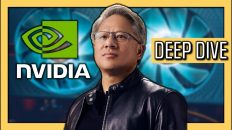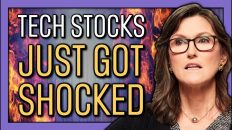Mentioned in Video:
- ARK Invest Innovation ETF (ARKK) – https://ark-funds.com/arkk
- ARK Invest Autonomous Technology & Robotics ETF (ARKQ) – https://ark-funds.com/arkq
- ARK Invest Next Generation Internet ETF (ARKW) – https://ark-funds.com/arkw
- ARK Invest Genomic Revolution ETF (ARKG) – https://ark-funds.com/arkg
- ARK Invest Fintech Innovation ETF (ARKF) – https://ark-funds.com/fintech-etf
- Support the channel and get extra member-only benefits by joining us on Patreon: https://www.patreon.com/tickersymbolyou
In this video, I ask the question that I feel every video covering ARK's trades should be asking: “can we tell when #ARKInvest sells a company because they have lost conviction as opposed to any other reason?” To try and answer that, we have to figure out what kinds of things active portfolio managers look at when they decide to make trades and view their trades in that context. For example, the way a portfolio comprised of our favorite electric vehicle #stocks, #Tesla, #Nio, and #Workhorse, is going to be managed very differently than a broad ETF like SPY and VOO, which track the S&P500. What does “managed” mean? It means tracking risks and adjusting your portfolio accordingly, and we dive deep into what that could look like. I list many other factors that might contribute to #ARKInvest making a selling decision, even for #Tesla, #ARK Invest's biggest and highest-conviction holding. We can then use that context to answer Jack Spencer's question about why ARK Invest would ever sell 3,303 shares of WKHS, which amounts to 0.35% of their position at the time of the sale and is such a specific number of shares. Finally, you should know that if you're doing research (watching YouTube videos, reading investor relations presentations, and constantly updating your #investment thesis), you are much smarter than you think you are. Remember, ARK stands for Active Research Knowledge, and #investing is about much more than picking stocks and holding forever.
Video Transcript:
[00:00:00.330]
ARK Invest just sold your favorite stock. Is it time to panic?
[00:00:03.510]
Recently, I came across something very worrying.
[00:00:06.810]
What the heck is going on over at ARK Invest?
[00:00:10.200]
Did ARK Invest just sell some Workhorse stock? And if they did, what does that really mean?
[00:00:15.000]
Cathie Wood has actually been selling a lot of shares of Tesla.
[00:00:21.810]
Has ARK Invest lost their minds and just hate Tesla now?
[00:00:24.990]
So the first thing I want to say is that this isn't click bait, but I'm not exactly sure what's going on.
[00:00:30.420]
Welcome to another episode of Ticker Symbol You, the channel that invests in you. My name is Alex and this episode, we're going to be asking two simple questions. Why did ARK Invest sell that stock you love and should you be panicking? This video is going to have three parts. Part one, understanding the big picture, part two, what active management actually means, and part three, all the different reasons that ARK Invest might sell a stock.
[00:00:55.290]
And stick around to the end of the video, where I'll tell you exactly what I do when I see ARK sell a position. Let's take a step back and look at the big picture. What's the point of an exchange trading fund and why not just pick stocks? Well, duh, the point of an ETF is to make money, right? Actually, that's not always true. Some ETFs exist to mirror the behavior of certain indexes. Ticker symbol SPY and VOO all try to mirror the behavior of the S&P 500.
[00:01:22.440]
Other ETFs are designed to stick to a common theme, even if their fund manager knows of a certain stock that would perform better. Examples of ETFs like this are TAN, which is a composition of solar stocks. Ticker Symbol MJ, which follows the budding cannabis sector, and of course, ARK Invest's five actively managed ETFs, which all follow different themes of disruptive innovation. So, ETFs do try to make money, but they also have other goals in mind. A lot of videos on YouTube talk about ARK Invest actively managing their portfolio, and that's why they sell
[00:01:55.290]
certain shares. ARK Invest Tesla holding is within a managed fund, not a hedge fund. So when any stock it holds goes on a crazy run, they have to sell some and get the percentages back in line with what the fund's goals and risk factors are.
[00:02:11.220]
Let's dive into that a little more. What does active management actually mean? Here's an example. Let's say we build a portfolio that has Tesla, NIO and Workhorse. Even though all three of those are electric vehicle stocks, one could argue that they're pretty well diversified. Workhorse focuses on last mile delivery, drone technology and maybe even refrigerated trucks. NIO is based in China and has a unique business model for swapping out batteries. And of course, Tesla is focused on self-driving and also plays in the renewable energy space with solar panels and the Tesla Powerwall.
[00:02:43.590]
So what happens if there's a huge lithium or nickel shortage? Supply goes down, demand continues to rise, and batteries just got a whole lot more expensive to manufacture. All three companies have to spend more money to make the same batteries for their vehicles. So the price of a vehicle goes up, fewer vehicles are sold and ultimately their stocks go down. In this anecdote, they share the same risk, the risk of a limited supply of lithium or nickel, driving up battery electric vehicle prices.
[00:03:12.000]
So it'd be good to know if the world is running out of lithium or nickel. So you could find another way to store energy before your competition does. This is why companies spend a lot of money staying informed on things like technology trends, policy trends, environmental trends and even social trends. And this is why ARK is named ARK. If you didn't know, ARK stands for Active Research Knowledge. Anyway, there's a tradeoff for making a portfolio exclusively out of electric vehicle stocks.
[00:03:40.050]
You're not exposed to risks outside of that sector. For example, EVs don't care whether or not cannabis gets legalized, I think. So you have a lot of exposure to a small amount of risks while having no exposure to a very large amount of risks. When stocks move up and down together, nerds like me would say those stocks are correlated. For example, electric vehicle stocks tend to be correlated with Tesla and move up and down with it. When two stocks reliably move in opposite directions from each other, we would call those stocks inversely correlated.
[00:04:11.100]
Think about if you were holding two stocks that were perfectly inversely correlated. As one goes up, the other would go down by the same amount and your portfolio wouldn't go anywhere. So ARK Invest and me, and hopefully you, spread out our risk by finding stocks that don't move together one way or another. When two stocks are perfectly correlated, they have a correlation of one. And when two stocks are perfectly inversely correlated, they have a correlation of negative one.
[00:04:39.120]
An acceptable amount of correlation between stocks tends to be zero plus or minus point seven, where closer to zero means less correlated. A more broad based ETF, like the ones we mentioned earlier that track the S&P500, flips the script from our hypothetical example. The S&P500 has a little bit of exposure to basically every type of risk, but the whole ETF won't rise or fall when something unexpected happens, unless that something affects the whole broader market, like a presidential election or a pandemic.
[00:05:09.570]
But those things almost never happen. There's actually one other thing worth mentioning about ARK's ETFs. It turns out that ARK's ETFs are not very correlated to other types of funds, because their holdings tend to cut across sectors and industries.
[00:05:24.290]
Registered investment advisors have learned, after two crashes, diversify, diversify, diversify, everyone is very well diversified. You know, traditional growth, traditional value, emerging markets, bonds and so forth, diversified. These core strategies are acting very much the same. In order to differentiate themselves in terms of stock holdings and performance, you would use a strategy like ARK's, which is focused on disruptive innovation, very high active share meaning ninety four percent of our stocks.
[00:06:04.550]
If you were to compare us against the broad indexes, we'd have ninety four percent active share, we'd only have an overlap of maybe five or six percentage points with the broad indexes. You want to slot that in. And, historically, we did a study at AllianceBernstein showing this. If you slot a strategy in like that to a core portfolio, what you will do is increase returns and lower risk over time. That sounds counterintuitive, but it's true because the correlation of our relative returns to traditional growth is very low.
[00:06:38.720]
We're not in the indexes for the most part, and our correlation of relative returns to traditional value is negative.
[00:06:45.830]
Let me say that again, because it's so important to ARK's investment thesis. ARK's ETFs can be slotted into almost any portfolio to increase gains and lower risk at the same time. And ARK will always be rewarded for keeping it that way. OK, let's get back to the big picture. An ETF is not always about making you the most money. It's trying to make you a good return while satisfying some other constraints. In an actively managed ETF, you pay a premium to have smart people keep an eye on the fund and manage its risks over time.
[00:07:16.220]
These are the reasons you shouldn't panic when ARK sells a stock, even if they sell out of that position completely. At the most basic level, we don't know which reason they sold that stock for. OK, so those are the basics of risk management. But once ARK picks their stocks, how do they actively manage their ETFs afterwards? And, getting back to the overall point of the video, can we figure out why they make the moves they make. Specifically,
[00:07:39.950]
can we figure out if they're ever making a move because they lost conviction in a company? One thing that's easy to forget is that ARK is an investment firm, not just a group of researchers. That's why they have the word “invest” in the name. That means that ARK has access to financial models and software to keep track of all of the things that we just mentioned. As all of the stocks they're holding continue to move up and down each trading day,
[00:08:02.150]
the software tells them how good their portfolios are doing compared to their ideal models. Another thing that I bet that software does is keep an updated running list of the lowest cost buys and sells that ARK can make to bring their portfolios back to where they want them to be. We also know that ARK Invest will look at whatever indicators that they think are best to see if a stock is overbought or overvalued and they'll sell that stock to buy it back at a lower price.
[00:08:28.400]
Recently, at ARK Invest, we've been asked quite a bit about our trading activity. Well, we've been in a volatile market, especially when it comes to innovation and disruptive innovation is inherently volatile itself. We take advantage of trading opportunities that this volatility presents. So if a stock is down for what we believe are very short term or short sighted reasons that have no impact on our five year time horizon, we typically will be buying a stock like that. On the other hand, when a stock reaches 10 percent of our portfolio, we cannot buy it any longer.
[00:09:13.100]
We can let it run up to twelve, thirteen. Sometimes we let it go a little above that. But typically, because by that time the stock has run 30 percent, has done 30 percent better than all of the other stocks in our portfolio, we will take profits. This is simply portfolio management.
[00:09:35.390]
Here are some other things they probably track that we have almost no insight into. How long have they been holding the shares that they sold and does that affect how their gains are taxed? Which shares are they selling? Their lowest cost ones or their highest cost ones? I'll cover all the different strategies for selling stocks in a different video, but I bet ARK Invest knows exactly which shares they're selling and exactly how much profits they're locking in. And of course, software helps them keep track of that.
[00:10:01.490]
There are probably a bunch of other requirements they need to meet. For example, do they need to be holding a certain amount in cash? Are they preparing themselves for better moves in the future because their research reveals something about the broader market? That's the whole point of active research knowledge. Get it? There's actually one other metric that I bet they track, and that metric is exposure to a given innovation platform, as you can see from their annual and quarterly reports, they track their exposure in each ETF to a given innovation technology and not by market sector, like most other ETFs do.
[00:10:33.520]
So when one of their stock prices goes to the moon, that ETFs exposure to that, given technology goes way up. Remember when we talked about keeping the correlation between stocks in a given ETF low? Well, this is the same thing, but by innovation platform to innovation platform, instead of buy stock to stock,. It's just another way to organize stocks and look at risks.
[00:10:54.970]
It's a little bit weird, isn't it? I mean, why would they even bother selling such a small position? None of us know exactly what's going on. That's why I also want to make this video. I want to get your guys' thoughts and opinions. Let me know what you think is happening, because this really is quite weird.
[00:11:08.470]
Putting all this together is the key to answering Jack's question about the strange number of Workhorse shares that ARK Invest sold. That's the number of shares that some financial model told ARK to sell in order to get their portfolio back in line with the model in the most cost effective way. And then a human active fund manager agreed with the software and pressed the sell button. So let's recap everything so far. Here are all the reasons that we've covered for why ARK might sell a stock.
[00:11:34.810]
They've made a set amount of gains and it's time to lock in profits. The stock exposes the fund to too much of a specific innovation platform, which is bad for the correlations inside the ETF. The stock exposes the fund to some other type of risk, which could be bad for how ARK's ETFs correlate with broader indexes. Their research reveals a new market condition which makes them rethink their exposure to a given innovation platform or how they want to rebalance that portfolio as a whole. Or, they find out something new and that changes their conviction in one specific company.
[00:12:06.760]
Now we have all the info we need to rephrase the question. As a refresher, here's the original question. Has ARK Invest lost their minds and just hate Tesla now?
[00:12:15.370]
OK, so here's my version of the question. Can we tell if ARK would have sold that stock if they were a stock picker like me or you instead of active fund managers? Specifically, can we tell when they've sold the stock because and only because they've lost conviction in the company? Nope.
[00:12:33.790]
No, seriously, that's the answer. Wait, does that make this video clickbait? I'll explain why. Let's go back to those six reasons. There are probably way more reasons than that, but let's pretend I'm smart enough to think of all the reasons that ARK Invest could ever sell a single share. The actual problem is that they can sell a position for more than one reason at a time. Remember, they have access to the best financial software, models, and tools to help them manage their portfolios.
[00:12:59.650]
And part of that software's job is to recommend the lowest cost moves to bring those portfolios back in line with the models. If you want to sound extra smart at dinner parties… Wait, do people still have those? Stick around to the end of the video and I'll tell you the fancy name for solving this type of math problem. The lowest cost moves are usually the ones that tackle as many of the reasons we talked about at once in a single trade. Even if they completely sell out of a position like they did with Salesforce just two weeks ago,
[00:13:27.940]
ticker symbol CRM. It's impossible to tell if they did that because they lost conviction or if they think they can just buy in at a better price. Even if it's not one of those two reasons, the models could have given them another completely valid reason to sell the stock to manage their portfolios. Did Salesforce just become a bad company overnight? As a side note, the visualizations I use when I go over our data are made in Tableau. Tableau is owned by Salesforce.
[00:13:55.390]
So wait, should we follow ARK Invest's every move or not? Let me show you exactly how I follow ARK Invest, and why you may be smarter than you think. It's very easy to tell yourself, well, Cathie Wood is smarter than me. So if she sells, I should too. If you're seeking out videos like this one, it's because you're trying to figure out what the experts are thinking and doing instead of just relying on emotion. Trust me, that alone makes you way smarter than you think.
[00:14:20.680]
The best way to use ARK Invest is as a news source to prompt specific stock market questions and do your own research about stocks that they put in front of you. The reason I pore through their data and do the market Monday updates is to add context to their trades, which is important for all the reasons mentioned throughout this video. So go ahead and subscribe and hit that notification bell if you want to be reminded when those come out. (It's on Mondays.)
[00:14:43.900]
And that's what this channel is really about, actively doing research and sharing knowledge to make you and myself a better investor, which is about much more than just picking stocks. Oh, yeah, that fancy math term, it's called global multivariate optimization. It's also the math behind how Tesla solves the self-driving problem. Global means the software is looking at the big picture, kind of like this video. It's giving ARK the best set of moves overall, not the best one move at a given time.
[00:15:11.380]
In chess, your global goal is to win the game and you have to think several moves ahead to do that, not play one great move at a time. Multivariate just means they're looking at more than one factor at a time when they make a decision, they are not just looking at profits, we covered just some of the other variables they may be looking at. Multivariate just means multiple variables. Optimization means they're looking for the best performing mix of all the factors that we talked about.
[00:15:37.800]
Another thing we probably can't know is exactly what best means to ARK, which adds another reason to why we can't ever be sure of why they sell. How do I know this? My undergrad, grad and postgrad work all focused on global multivariate optimization for cameras and radars. My name is Alex and this is Ticker Symbol You. Thanks for watching. And remember, the best investment you can make is in You.
If you want to comment on this, please do so on the YouTube Video Here














